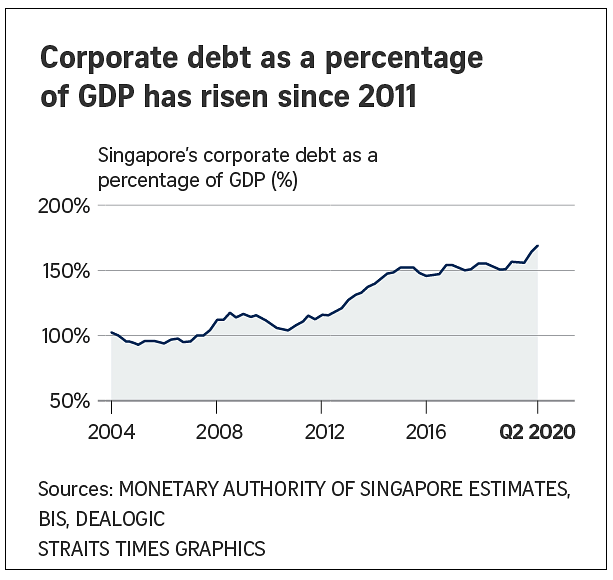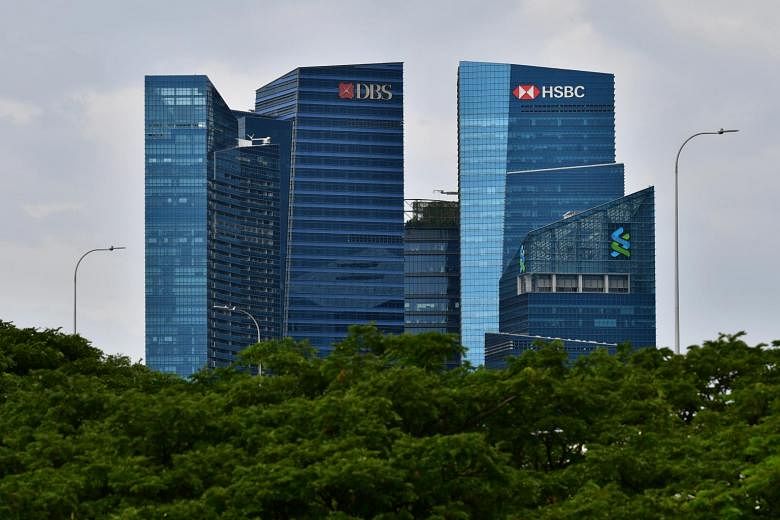SINGAPORE - Companies in Singapore suffered a significant fall in earnings due to the Covid-19 pandemic and sank deeper into debt, although most should still be able to withstand short-term financial pressures for now, the Monetary Authority of Singapore (MAS) said.
In its annual Financial Stability Review released on Tuesday (Dec 1), MAS also said firms and banks have so far remained generally resilient despite the shock of the pandemic.
It added that swift government support for the corporate sector has further helped to alleviate short-term liquidity pressures, with efforts focused on extending credit to support small and medium-sized enterprises (SMEs).
"While leverage and maturity risks have increased in the near term, most Singapore firms should be able to withstand short-term pressures on their financial positions," said MAS.
"However, corporates with highly leveraged positions and smaller firms with weaker cash buffers remain vulnerable and could come under more severe strain," it cautioned.
Firms such as those in construction, travel-related services and property were also harder hit by a drop in domestic demand and safe management measures, the report said.
Corporate debt as a percentage of gross domestic product (GDP) has been rising because of low interest rates. The debt ratio hit 163 per cent in the second quarter of this year, reflecting both a pick-up in corporate debt and a fall in GDP.
At the same time, banks saw a rise in corporate non-performing loans ratios, which rose to 3.4 per cent in the third quarter of this year, compared with 2.5 per cent in the same period last year.
This ratio was especially high in sectors such as general commerce and transport, storage and communication, which were affected by disruptions to international travel.
"The higher ratios reflect the prevalence of firms in sectors adversely affected by the Covid-19 pandemic - wholesale trade, retail, food and beverage, tourism-related industries - and oil-related industries impacted by the collapse of oil prices earlier in the year," MAS said.
Overall, Singapore firms "have weathered the Covid-19 shocks relatively well" as they took steps to retain liquidity while being supported by the Government and other assistance measures, said MAS.
As a response to the severe earnings shock, listed firms have bolstered cash buffers, resulting in healthier liquidity indicators, MAS noted. This reflects firms' precautionary demand for cash and their ability to continue accessing the bond market and bank financing.
But it warned that even as firms eased short-term refinancing concerns through increased cash holdings, debt sustainability in the medium to long term poses increased risks.
Smaller firms would also have weaker cash buffers and be more severely impacted by the crisis, it added.
That said, financing conditions remain supportive against an uneven economic recovery, with the banking system assessed to be resilient despite hits to banks' credit quality.
"The banking sector has experienced some deterioration in credit quality, but strong capital and liquidity positions provide a robust base for banks to continue supporting the economy's demand for credit," MAS said.
It noted that insurers have also remained strong amid the uncertain economic outlook, bolstered by the enhanced capital framework that came into effect in March this year.

MAS said that while the economy is expected to pick up next year, its uneven trajectory will impinge on corporate profits. The financial sector and firms have to remain vigilant, it added.
"Banks are likely to face challenging operating conditions in the near term. The prolonged low interest rate environment and asset quality deterioration amid continued uncertainty in the global outlook will exert pressure on banks' profitability, even as they continue to maintain strong underwriting standards and healthy capital buffers," it said.
"Banks should also continue to actively monitor and manage their foreign currency risks prudently to guard against a renewed tightening of global funding conditions."
MAS added that insurers are similarly expected to be impacted by a prolonged low interest rate environment.
"They should closely monitor their solvency positions and adopt a prudent and forward-looking perspective to capital management."


